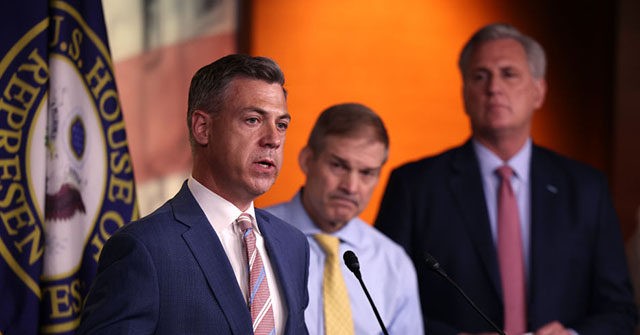

The five Republicans initially set to serve on the January 6 select committee released a report Wednesday of findings from their investigation into the U.S. Capitol’s security preparedness ahead of the 2021 riot.
The Republicans’ 141-page report explores at length the security measures taken leading up to the events of January 6, 2021, an issue they say the January 6 committee has “thus far ignored.”
The report serves as a counter document to the select committee’s anticipated behemoth conclusive report, which is expected to come this week after the committee held a final public meeting Monday summarizing its investigation and announcing criminal and ethics referrals.
“Leadership and law enforcement failures within the U.S. Capitol left the complex vulnerable on January 6, 2021,” the report states. “The Democrat-led investigation in the House of Representative, however, has disregarded those institutional failings that exposed the Capitol to violence that day.”
The January 6 committee, a nine-member panel of seven Democrats and two Never Trump Republicans, the latter of whom are finishing out their final days in office, has spent 18 months investigating the riot with an outsized and highly publicized focus on former President Donald Trump and his allies.
The executive summary of the select committee’s report, for example, lists 17 key findings from their investigation. The first 12 zero in on Trump, while the last five focus on security measures and intelligence gathering for security purposes.
The GOP’s report was prepared at the direction of Reps. Jim Banks (R-IN), Jim Jordan (R-OH), Rodney Davis (R-IL), Troy Nehls (R-TX), and Kelly Armstrong (R-ND). House GOP Leader Kevin McCarthy had initially appointed these five members to serve on the January 6 committee, but after House Speaker Nancy Pelosi (D-CA) rejected Banks and Jordan, McCarthy pulled all the GOP members from the committee and refused to participate in it, calling the committee a “sham.”
Read the Republicans’ report below:
The report details how U.S. Capitol Police (USCP) had “sufficient information from an array of channels to anticipate and prepare for the violence that occurred.”
“However, officers on the front lines and analysts in USCP’s intelligence division were undermined by the misplaced priorities of their leadership,” the report states. “Those problems were exacerbated by the House Sergeant at Arms, who was distracted from giving full attention to the threat environment prior to January 6, 2021 by several other upcoming events.”
The Republicans’ report also demonstrates coordination between then-Sergeant at Arms Paul Irving and Pelosi’s office in the leadup to the riot, making the case that Irving, a member of the USCP board by virtue of his position, shut Republicans out of critical conversations and “succumbed to political pressures” from Pelosi and Democrat leadership.
“In one case, Irving even asked a senior Democratic staffer to ‘act surprised’ when he sent key information about plans for the Joint Session on January 6, 2021 to him and his Republican counterpart,” the report found. “The senior Democratic staffer replied: ‘I’m startled!’”
The report also delves into underlying concerns about the optics of bolstering law enforcement at the Capitol.
“Documents and communications show concerns about the public perception of military personnel at the Capitol and how the use of force by officers against violent protestors were well known among Irving, Democratic leadership, and USCP leadership,” the report states, contending the concerns “diminished” the ability of officers to “effectively defend” the Capitol.
In the aftermath of the riot in January 2021, Irving resigned, and communication on page 101 of the Republicans’ report shows Irving’s staff ultimately placing blame on him and Pelosi. “Our department was doing the best they could with what they had,” a frustrated sergeant at arms staffer wrote in an email.
Republicans have long condemned the January 6 committee for refusing to investigate Pelosi specifically.
House GOP conference chair Elise Stefanik (R-NY) highlighted at the time of the January 6 anniversary this year that Pelosi appeared exempt from blame for the riot, despite Pelosi’s history of overseeing security-related actions at the Capitol, such as installing magnetometers, holding a briefing on security preparedness ahead of a September 18 rally, and limiting Capitol visitation because of coronavirus.
January 6 committee chair Rep. Bennie Thompson (D-MS) all but said Pelosi was off-limits in a CNN interview in July 2021. “Well, if you look at the charge that we have in the resolution, it says the facts and circumstances around January 6. I don’t see the speaker being part and parcel to that,” Thompson said.
The GOP report concludes with a number of recommendations, including calling for increased transparency from and structural changes to the USCP board.
Write to Ashley Oliver at [email protected]. Follow her on Twitter at @asholiver.




